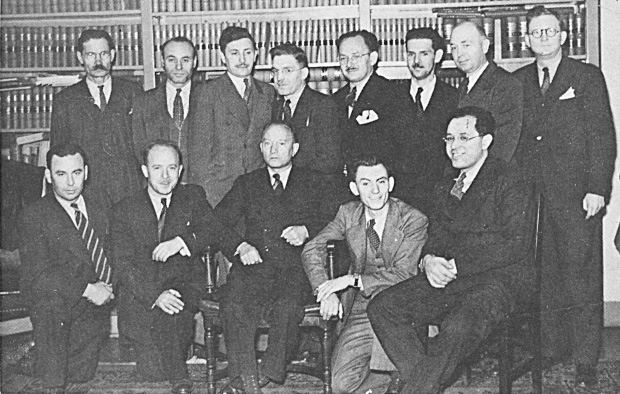Browse "Politics & Law"
-
Article
Colonial Office
Colonial Office, a department established by the British government to administer its colonial possessions, including British North America.
"https://development.thecanadianencyclopedia.ca/images/tce_placeholder.jpg?v=e9dca980c9bdb3aa11e832e7ea94f5d9" // resources/views/front/categories/view.blade.php
https://development.thecanadianencyclopedia.ca/images/tce_placeholder.jpg?v=e9dca980c9bdb3aa11e832e7ea94f5d9
-
Article
Colonialism in Canada
Colonialism is the process through which a foreign people establish control over a territory and, if applicable, its Indigenous peoples. Control is established through various means, including political or economic legislation directed at Indigenous peoples or their lands, foreign settlement, and assimilation of Indigenous peoples into the colonizer’s culture. While colonialism in different forms is a defining mark of the history of many countries, colonialism in Canada began in earnest with French settlement at Quebec in 1608. The history of the second colonial power to influence Canada, the British, began in 1670 when the Crown issued a Royal Charter to the Hudson’s Bay Company.
"https://development.thecanadianencyclopedia.ca/images/tce_placeholder.jpg?v=e9dca980c9bdb3aa11e832e7ea94f5d9" // resources/views/front/categories/view.blade.php
https://development.thecanadianencyclopedia.ca/images/tce_placeholder.jpg?v=e9dca980c9bdb3aa11e832e7ea94f5d9
-
Article
Commercial Law
Commercial law is that branch of private law concerned primarily with the supply of goods or services by merchants and other businesses for profit. Textbooks on commercial law frequently differ on the range of topics treated in them.
"https://development.thecanadianencyclopedia.ca/images/tce_placeholder.jpg?v=e9dca980c9bdb3aa11e832e7ea94f5d9" // resources/views/front/categories/view.blade.php
https://development.thecanadianencyclopedia.ca/images/tce_placeholder.jpg?v=e9dca980c9bdb3aa11e832e7ea94f5d9
-
Article
Commission of Government
The Commission of Government in Newfoundland was established in response to an extraordinary set of circumstances.
"https://development.thecanadianencyclopedia.ca/images/tce_placeholder.jpg?v=e9dca980c9bdb3aa11e832e7ea94f5d9" // resources/views/front/categories/view.blade.php
https://development.thecanadianencyclopedia.ca/images/tce_placeholder.jpg?v=e9dca980c9bdb3aa11e832e7ea94f5d9
-
Article
Commission of Inquiry on the Position of the French Language and on Language Rights in Québec (Gendron Commission)
The Commission of Inquiry on the Position of the French Language and on Language Rights in Québec (1969–1973) is a royal inquiry commission set up by the government under Jean-Jacques Bertrand. Noting the inequality between the English and French languages and the federal state’s hesitancy to take measures to encourage the independence and general development of the French Canadian population, the Gendron Commission elaborated a series of recommendations which led to the adoption of the Language Acts in 1974 and 1977 (see Quebec Language Policy).
"https://development.thecanadianencyclopedia.ca/images/tce_placeholder.jpg?v=e9dca980c9bdb3aa11e832e7ea94f5d9" // resources/views/front/categories/view.blade.php
https://development.thecanadianencyclopedia.ca/images/tce_placeholder.jpg?v=e9dca980c9bdb3aa11e832e7ea94f5d9
-
Article
Commissioner for Oaths
A Commissioner for Oaths is any person over 18 years of age commissioned by a lieutenant-governor to administer oaths and take affidavits.
"https://development.thecanadianencyclopedia.ca/images/tce_placeholder.jpg?v=e9dca980c9bdb3aa11e832e7ea94f5d9" // resources/views/front/categories/view.blade.php
https://development.thecanadianencyclopedia.ca/images/tce_placeholder.jpg?v=e9dca980c9bdb3aa11e832e7ea94f5d9
-
Article
Committee for an Independent Canada
The Committee for an Independent Canada (CIC) was conceived by Walter GORDON, Peter NEWMAN and Abraham Rotstein as a citizens' committee to promote Canadian economic and cultural independence. They recruited Jack MCCLELLAND and Claude RYAN as cochairmen and launched the CIC on 17 September 1970.
"https://d2ttikhf7xbzbs.cloudfront.net/media/media/346651f7-0648-43dc-b40f-649d2e4a6e84.jpg" // resources/views/front/categories/view.blade.php
https://d2ttikhf7xbzbs.cloudfront.net/media/media/346651f7-0648-43dc-b40f-649d2e4a6e84.jpg
-
Article
Common Law
Common law, the system of law that evolved from the decisions of the English royal courts of justice since the Norman Conquest (1066).
"https://development.thecanadianencyclopedia.ca/images/tce_placeholder.jpg?v=e9dca980c9bdb3aa11e832e7ea94f5d9" // resources/views/front/categories/view.blade.php
https://development.thecanadianencyclopedia.ca/images/tce_placeholder.jpg?v=e9dca980c9bdb3aa11e832e7ea94f5d9
-
Article
Common-Law Unions in Canada
A common-law union occurs when two people live together in a conjugal relationship, generally for at least a year (or more depending on the province in which they reside). Common-law couples in Canada have many of the same legal, parental and financial rights and obligations as married couples.
"https://development.thecanadianencyclopedia.ca/images/tce_placeholder.jpg?v=e9dca980c9bdb3aa11e832e7ea94f5d9" // resources/views/front/categories/view.blade.php
https://development.thecanadianencyclopedia.ca/images/tce_placeholder.jpg?v=e9dca980c9bdb3aa11e832e7ea94f5d9
-
Article
Commonwealth
The Commonwealth of Nations is made up of 56 countries, including Canada, that were for the most part once part of the British Empire. They work together on international policy and hold a major sports event every four years. It is one of the world’s oldest political associations of states.
"https://d2ttikhf7xbzbs.cloudfront.net/media/media/2f10ecd8-58d3-4a10-8b33-fa4f1d617d92.jpg" // resources/views/front/categories/view.blade.php
https://d2ttikhf7xbzbs.cloudfront.net/media/media/2f10ecd8-58d3-4a10-8b33-fa4f1d617d92.jpg
-
Article
Commonwealth of Learning
The Commonwealth of Learning (COL) is an intergovernmental organization that helps developing countries improve access to quality education and training.
"https://d2ttikhf7xbzbs.cloudfront.net/media/media/f973641b-750e-4197-9ba7-dc025d236929.jpg" // resources/views/front/categories/view.blade.php
https://d2ttikhf7xbzbs.cloudfront.net/media/media/f973641b-750e-4197-9ba7-dc025d236929.jpg
-
Article
Communal Properties Act Case
Walter v Attorney-General of Alberta (1965-69) tested the constitutional validity of the Communal Properties Act (1955), which had the effect of restricting the amount of lands that could be owned communally by religious groups such as the HUTTERITES and the DOUKHOBORS.
"https://d2ttikhf7xbzbs.cloudfront.net/media/media/9dde7de9-5182-4dab-a6b3-f141ce3c9272.jpg" // resources/views/front/categories/view.blade.php
https://d2ttikhf7xbzbs.cloudfront.net/media/media/9dde7de9-5182-4dab-a6b3-f141ce3c9272.jpg
-
Article
Communauté des biens
Communauté des biens (community of property), term used in the legal codes of NEW FRANCE and Québec to describe the pooled assets of husband and wife. It began as part of the Coutume de Paris, introduced about 1640 and the sole legal code of the colony after 1664.
"https://development.thecanadianencyclopedia.ca/images/tce_placeholder.jpg?v=e9dca980c9bdb3aa11e832e7ea94f5d9" // resources/views/front/categories/view.blade.php
https://development.thecanadianencyclopedia.ca/images/tce_placeholder.jpg?v=e9dca980c9bdb3aa11e832e7ea94f5d9
-
Article
Communications Law
Communications LawCanadian communications law includes judicial decisions and statutes governing communications firms; however, the most important element of Canadian communications law comes from the decisions of the federal regulator, the CANADIAN RADIO-TELEVISION AND TELECOMMUNICATIONS COMMISSION (CRTC), which regulates radio, television, broadcast distribution undertakings (cable, satellite and IPTV television services) and most telecommunication services, wireless services and Internet service providers (ISPs). Not all communications are subject to regulatory oversight in Canada. Newspapers are not subject to...
"https://development.thecanadianencyclopedia.ca/images/tce_placeholder.jpg?v=e9dca980c9bdb3aa11e832e7ea94f5d9" // resources/views/front/categories/view.blade.php
https://development.thecanadianencyclopedia.ca/images/tce_placeholder.jpg?v=e9dca980c9bdb3aa11e832e7ea94f5d9
-
Article
Communist Party of Canada
The Communist Party of Canada, founded in 1924 as the Canadian branch of the international Communist movement, is a fringe political party that advocates for a pure socialist society based on the ideas of Vladimir Lenin and Karl Marx.
"https://d2ttikhf7xbzbs.cloudfront.net/media/media/b60ccc90-703a-48c2-a421-cd094b40b33a.jpg" // resources/views/front/categories/view.blade.php
https://d2ttikhf7xbzbs.cloudfront.net/media/media/b60ccc90-703a-48c2-a421-cd094b40b33a.jpg
